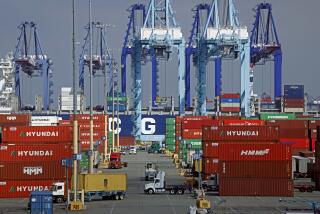A Font of Grief in New York, a Savvy Transaction in China
- Share via
SHANGHAI — Even as New Yorkers emotionally debate what kind of memorial should honor those killed in the Sept. 11 attack on the World Trade Center, 50,000 tons of mangled metal from the twin towers have already been sold off and shipped to China as scrap.
China’s largest steel company denied reports that it plans to make souvenirs out of metal from the collapsed buildings. But officials at Shanghai Baosteel here said the company did buy scrap from the wreckage.
For those involved in the deal, the purchase was an ordinary business transaction.
“Scrap from the World Trade Center is cheap, and the quality is good,” said Cao Xianggen, an engineer at Baosteel. “America can’t use it all, but China has a huge demand for it.”
For some victims’ families, however, the selling of the steel that entombed their loved ones could prove an example of coldhearted global trade.
The families had made emotional appeals to the city of New York to stop the recycling until further clues could be found about the towers’ collapse. New York officials said the investigation could continue without the physical wreckage.
In New York, city officials confirmed that at least two companies had bid successfully on scrap material from the trade center, but they stressed that they didn’t know what became of the material after it was bought.
Baosteel, which is based in this port city, is believed to have bought the steel from one of the two companies. A staff member at the firm’s shipping department said late Friday that a ship carrying the scrap left the United States in mid-December but that it probably wouldn’t reach China on schedule. Part of the 50,000-ton purchase had been due to arrive Friday.
China is one of the world’s leading producers of steel. During the Great Leap Forward in the 1950s, the country wanted to prove its self-sufficiency, so it required all citizens to turn in pots and pans, antique furniture decorations, any metal objects they could find--all for the purpose of forging steel.
Today, China relies on other countries for its raw material. In 2000, the country imported 5.1 million tons of scrap, according to the Shanghai Daily. The average selling price is about $150 a ton, the newspaper said.
Baosteel bought some of the remains of the World Trade Center for $120 a ton, according to the official Beijing Youth Daily.
The management office at Metal Management in New Jersey, one of the two original buyers, did not return calls.
But Alan Ratner, president of Metal Management, told the New York Daily News last month: “This is recycling at its purest form. Our job is to take material and find a beneficial reuse for it.”
Some of the wreckage, Ratner said, will be donated to a memorial.
With nearly 3,000 people having died at the World Trade Center, and weighing the sensitivity of U.S.-China relations, Baosteel has vehemently denied reports made by the Beijing Youth Daily that the company might profit from sales of mini-trade center replicas.
“Baosteel absolutely did not buy scrap with the intention of making arts and craft,” read a posting on the company’s Web site Friday.
Chinese industry experts stress that Baosteel simply made a sound business decision based on the high quality of the steel from the trade center. Indian firms also bought scrap from New York’s disaster zone.
The trade center wreckage is expected to produce an estimated 300,000 tons of structural steel. The girders, columns and beams will be melted down and reforged into building materials in Asia.
Typically, such scrap is used to construct skyscrapers, roads, bridges, cars and some household appliances.
Much of the steel at the World Trade Center was made in Japan.
“Back in the 1970s, it was considered the finest quality in the world,” a Baosteel official who gave only his last name, Xu, told a local newspaper.
The U.S. scrap-recycling industry is worth at least $20 billion a year. Asia has been an important market because buyers in the region tend to pay more than U.S. outlets.
“The global steel industry is now concentrated in China, India, Japan and Korea,” said another Baosteel official, who gave only his last name, Yang. “It’s normal that scrap from the WTC would be exported to China and India. This is a result of the global division of labor.”
*
Times staff writer John J. Goldman in New York contributed to this report.
More to Read
Sign up for Essential California
The most important California stories and recommendations in your inbox every morning.
You may occasionally receive promotional content from the Los Angeles Times.












